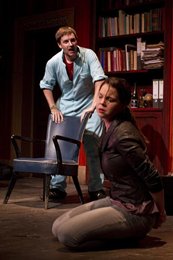When Agatha Christie’s Witness for the Prosecution played in the old Metropole Cinema, in the 1950s, latecomers were barred and the entire audience was sworn to secrecy about the final disclosures in the plot (by the way, Tyrone Power did it – I was a child at the time, exempt from the gagging order!) Anthony Brophy’s new play occupies the same territory. It is part of a genre based on chicanery: “clever talk intended to mislead, a dishonest argument, trickery, deception” (Collins 21st Century Dictionary.) Shades of Death Trap and Sleuth: nothing is as it appears; revelation upon outlandish revelation comes relentlessly off an assembly line of improbabilities, to keep the suspense or the interest or simply the plot going. Nothing in the identity of any character is what it seems, and this ultimately denies each one any vestige of psychological truth. They are simply pawns in Brophy’s aspiration to provide high-octane escapist entertainment.
.jpg.aspx%3Fwidth=260&height=174) The lights come up on a conventional office set (design by Owen MacCarthaigh) – shelves filled with legal tomes, drinks at the ready, mini-fridge, firm’s name in white letters on the windows – and there’s a conventional opening, as smartly-dressed man mimes a telephone conversation. Enter chirpy (male) cleaner who dusts the shelves (very Agatha Christie) while engaging solicitor – for that’s what he is – in lively chit-chat that swerves in a new and sinister direction when he locks the outer door and produces a revolver.
The lights come up on a conventional office set (design by Owen MacCarthaigh) – shelves filled with legal tomes, drinks at the ready, mini-fridge, firm’s name in white letters on the windows – and there’s a conventional opening, as smartly-dressed man mimes a telephone conversation. Enter chirpy (male) cleaner who dusts the shelves (very Agatha Christie) while engaging solicitor – for that’s what he is – in lively chit-chat that swerves in a new and sinister direction when he locks the outer door and produces a revolver.
A plot unfolds faster than a flag in a gale. Try to explain it to someone who hasn’t actually seen it: it’s bewildering. Basically, there’s been a hit-and-run, a six-year-old child has been killed, the perpetrator has got off scot-free and justice must be done.
At this stage the play could be a black comedy about class. The guilty party has eluded punishment by having friends in high places; the father of the dead child is a druggie gaol-bird – what chance does he have of finding closure? It toys with serious issues – random killing, justice, privilege (the “Bang & Olufsson paradise”) and disadvantage, truth and lies, appearances and reality – but these are trivialized and rendered crude. They are not the real subject matter of the play. Anthony Brophy elects to use all potential issues as grist to the plot-mill. There is some outraged invective against ostentatious wealth (“the shiny Jag”), the pomposity and exclusivity of the legal profession and even abusive references to middle-class culture (The Gate and the Project). But this seems misplaced – more the playwright’s outrage than that of the characters – and, as the play is a piece of pure chicanery, designed to deceive and entertain the audience, it misses out on the potential satire.
 Brophy’s language has a scatological vigour, invested with gutter energy, particularly in the mouth of Ray the cleaner (Emmet Kirwan in an eye-catching, lithe and intense performance). He tells a Tiger joke (Woods not the Economy), talks of “shitting an onion” - not for the maiden aunt. For a brief moment, Ray makes a serious point when he insists on demolishing the evasively-phrased, self-denying evasions of the solicitor and demands that he tells the plain truth. When Julia, the judge’s daughter/solicitor’s lover (Jane McGrath, who invests a lot of ‘attitude’ into her characterisation, but who seems too petulant and adolescent to be plausible replacement wife for one of her dad’s cronies) gets going, her language coarsens into gratuitous crudity. We don’t expect ‘bounders’ or ‘cads’ but the genitalia-related insults become wearisome.
Brophy’s language has a scatological vigour, invested with gutter energy, particularly in the mouth of Ray the cleaner (Emmet Kirwan in an eye-catching, lithe and intense performance). He tells a Tiger joke (Woods not the Economy), talks of “shitting an onion” - not for the maiden aunt. For a brief moment, Ray makes a serious point when he insists on demolishing the evasively-phrased, self-denying evasions of the solicitor and demands that he tells the plain truth. When Julia, the judge’s daughter/solicitor’s lover (Jane McGrath, who invests a lot of ‘attitude’ into her characterisation, but who seems too petulant and adolescent to be plausible replacement wife for one of her dad’s cronies) gets going, her language coarsens into gratuitous crudity. We don’t expect ‘bounders’ or ‘cads’ but the genitalia-related insults become wearisome.
Barry Barnes (Robert, the solicitor) gives a strong performance as a man who moves from the ineffectual to the assertive and back again. Add a recorded cameo by Cathy Belton and one has a well-matched and talented cast working hard for Brophy.
There’s the seed here of a slick entertainment, but for all its breath-taking pace, there’s a stasis about Paul Meade’s direction. Of course, with just a desk, a chair and a locked door; with two out of three characters with their hands cuffed behind their backs, the action is bound to be static. There are enough bangs and menace to shock the audience into alertness, but it’s hard to give a damn about these pawns and the relentless revelations.
Derek West is the Arts & Education Officer of the National Association of Principals and Deputy Principals.